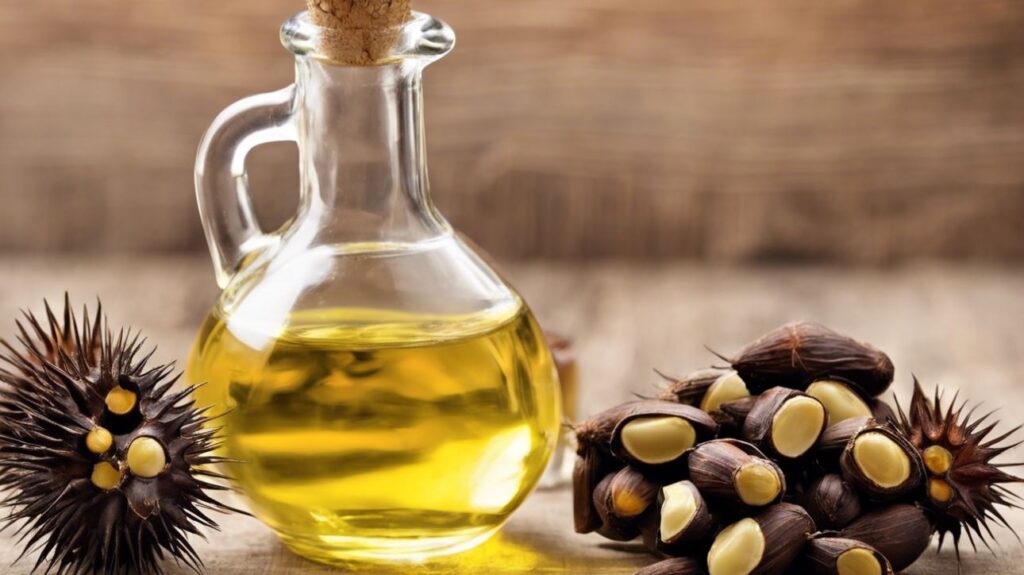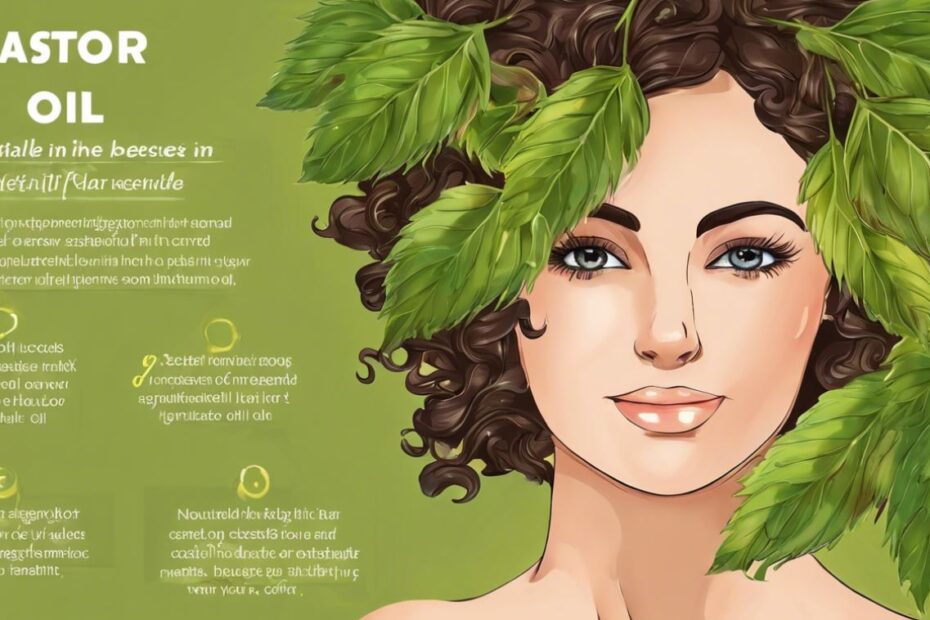Castor oil has become a popular natural treatment for hair health in recent years. Derived from the seeds of the castor oil plant, this vegetable oil is rich in nutrients that provide several benefits for hair growth and appearance. In this comprehensive guide, we’ll explore how castor oil can help strengthen, moisturize, and stimulate your locks.
The Nutrients in Castor Oil that Benefit Hair
Castor oil contains high concentrations of vitamin E, proteins, and beneficial fatty acids that nourish hair follicles and scalp health. Here’s an overview of the key nutrients and how they help hair:
Vitamin E
Castor oil is a great source of vitamin E, a powerful antioxidant. Antioxidants help fight free radicals that can damage hair follicles and cause breakage. Vitamin E also supports circulation in the scalp to encourage healthier hair growth.
Proteins
The proteins in castor oil penetrate deep into hair strands to repair damage and protect from future breakage. Protein-rich oils help make each strand stronger and more resilient.
Ricinoleic Acid
Castor oil contains high levels of ricinoleic acid, a type of fatty acid that has antibacterial and anti-inflammatory properties. This helps keep the scalp and hair follicles healthy by preventing problems like dandruff and scalp infections.
Omega-6 Fatty Acids
Omega-6 fatty acids nourish hair by providing essential moisture. This helps reduce dry, brittle strands prone to breakage and split ends. The fatty acids in castor oil coat each hair shaft to lock in hydration.
Minerals
Castor oil also contains trace amounts of beneficial minerals like selenium, magnesium, and calcium that support healthy hair growth cycles and strong strands resistant to damage.
The Benefits of Castor Oil for Different Hair Types
With its rich nutrient profile, castor oil can improve the health and appearance of all hair types. Here are some of the top benefits for various hair textures and needs:
Dry or Damaged Hair
The nourishing fatty acids in castor oil are excellent for enhancing moisture and repairing dry, frizzy locks. Applying castor oil can help hydrate parched strands, reduce split ends, and restore smoothness to coarse, damaged hair.
Thin or Brittle Hair
If you struggle with weak, thinning hair prone to breakage, castor oil can strengthen each strand and improve resilience. Massaging it into the scalp may also boost circulation to encourage regrowth. The vitamin E boosts antioxidant protection against damage.
Dandruff and Scalp Infections
Castor oil’s antibacterial and anti-inflammatory properties make it useful for treating dandruff, scalp folliculitis, and infections. Gently massaging it into the scalp can help soothe irritation, reduce flaking, and prevent recurring issues.
Slow Hair Growth
By nourishing hair follicles and increasing scalp circulation, castor oil can give sluggish hair growth a boost. The omega fatty acids provide building blocks for healthy new hair. This makes castor oil helpful for regrowing hair after illnesses, stress, or post-partum hair loss.
Frizzy, Unmanageable Hair
Castor oil is a godsend for taming frizz and adding manageability to unruly, coarse hair. Applying a small amount while hair is damp can help smooth the cuticle and reduce frizz-causing flyaways. This leaves hair looking sleek and glossy.
Split Ends
A couple drops of castor oil applied just to the ends of your hair can help reduce split ends and prevent new ones from forming. Split ends cause significant hair damage, so using castor oil for targeted repair is recommended every few weeks.
How to Use Castor Oil for Hair Health
Castor oil is easy to incorporate into your regular hair care routine. It can be used alone or combined with other nourishing ingredients to enhance benefits. Here are some tips for using castor oil on your hair effectively:
As a Scalp Massage
Massaging diluted castor oil into your scalp increases circulation, which stimulates hair follicles for growth. Add a teaspoon of castor oil to a tablespoon of carrier oil like coconut or almond oil. Apply to the scalp and massage gently using small circular motions.
As a Pre-Shampoo Treatment
Apply castor oil to dry hair and scalp a few hours before shampooing. Cover hair with a shower cap and allow the oil to penetrate fully. This deep treatment helps nourish hair and follicles while also hydrating and smoothing rough cuticles.
In a Hair Mask
Mix castor oil with ingredients like olive oil, honey, and avocado to create a deeply moisturizing hair mask. Coat strands thoroughly and let sit for 30-60 minutes before rinsing out. Hair will look shinier and softer.
As a Leave-In Conditioner
Rub a couple drops of castor oil between your palms and smooth through damp hair after washing. This provides light moisturizing and frizz control without leaving hair greasy or limp. Concentrate on mid-lengths and ends for extra conditioning.
For Split End Repair
Apply a small amount of castor oil just to hair ends after showering. Avoid getting oil on roots and lengths to prevent greasiness. Wrap hair in a towel for 30 minutes then style as usual. The oil will penetrate split ends to repair damage.
As an Overnight Treatment
For an ultra-intensive treatment, work castor oil thoroughly through dry hair and scalp before bed. Cover hair with a shower cap overnight allowing extended absorption time. Wash hair in the morning and enjoy smoother, more nourished locks.

Castor Oil Hair Products to Try
There are many haircare products that incorporate castor oil along with other beneficial ingredients for optimal results:
- SheaMoisture Jamaican Black Castor Oil Strengthen & Restore Conditioner – Ideal for damaged, overprocessed hair in need of repair.
- Tropic Isle Living Jamaican Black Castor Oil – Can be used alone or added to other treatments. Cold-pressed and dark in color for purity.
- Sunny Isle Jamaican Black Castor Oil Hair Food – Combines castor oil with nourishing botanicals in one nourishing pomade.
- Shescentit Jamaican Black Castor Oil Hair Serum – Lightweight serum infused with castor oil plus silk amino acids and shea butter.
- Carol’s Daughter Goddess Strength 7 Oil Blend – Features castor oil mixed with six other oils to increase moisture and shine.
Is Castor Oil Safe for All Hair Types?
Castor oil is typically safe to use on all hair types. However, those with sensitive skin should first do a patch test by applying a small amount of oil to the inner elbow area and monitoring for irritation.
It’s also best to start slowly with castor oil. Using too much at once can temporarily cause greasy-looking hair for some. Work up to more frequent use once you know how your hair responds.
Avoid applying castor oil to the scalp if you have any open wounds or irritated skin conditions. And rinse thoroughly after use to prevent clogged follicles that could cause acne or folliculitis breakouts.
The Takeaway
With its high vitamin E content, fatty acids, and proteins, castor oil is a boon for healthier, more lustrous hair. Using castor oil treatments and products can strengthen strands, boost growth, tame frizz, and give hair the moisture it craves. Castor oil is suitable and beneficial for all hair types when used properly. Incorporate it into your regular regimen and see fuller, silkier hair in no time.
Here are some frequently asked questions about using castor oil for hair:
Does castor oil really help hair grow faster?
There’s some evidence that castor oil can speed up hair growth. The fatty acids nourish follicles, while the oil’s anti-inflammatory and antimicrobial properties create ideal conditions for growth. Massaging the scalp also boosts circulation. More research is still needed, but many report faster growth after using castor oil.
How often should you use castor oil on your hair?
Using castor oil 1-2 times per week is ideal for most people. Those with very damaged hair can use it 3-4 times weekly. Be sure to start slowly and reduce frequency if hair looks or feels too oily.
Should you wash your hair after using castor oil?
It’s generally recommended to wash castor oil out after leaving it on for at least one hour. Leaving it in longer can cause buildup and greasy-looking strands. Be sure to wash hair with a clarifying shampoo to remove all oil residue after deep conditioning treatments.
Does castor oil help with hair loss?
Castor oil alone won’t treat the underlying causes of hair loss. However, nourishing the scalp and follicles optimizes conditions for regrowth. Some research indicates castor oil may support regrowth after certain types of hair loss. It’s useful alongside other treatments for alopecia.
In summary, castor oil is a centuries-old natural remedy that science has validated for its hair-boosting abilities. With rich hydration for strands and circulation-boosting properties for the scalp, castor oil is a haircare staple worth incorporating into your regimen. Be patient, start slowly, and enjoy the benefits of lustrous, healthy hair that castor oil can bring.
Conclusion: How Castor Oil Benefits Hair
In conclusion, castor oil is a time-tested natural remedy that can improve hair growth, texture, and luster. With its high concentrations of fatty acids, vitamin E, minerals, and proteins, castor oil nourishes hair follicles and protects strands from damage. It’s suitable for all hair types and works well as a scalp treatment, conditioning mask, frizz serum, split end remedy, and more. Castor oil boosts moisture, repairs damage, reduces dandruff, and helps grow thicker, faster-growing hair when used consistently. Implement a weekly castor oil haircare regimen for healthier, more radiant locks.





